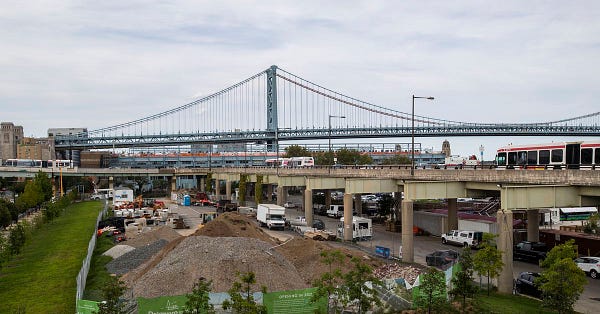
This is Boondoggle, the newsletter about corporations ripping off our states and cities. If you’re not currently a subscriber, please click the green button below to sign up. Thanks!
The fact that America’s professional sports teams are currently playing in mostly empty stadiums hasn’t stopped them from pursuing public subsidies. But a funny thing happened on the Philadelphia 76ers way to a new publicly-funded arena: The city said no.
Philadelphia has been looking for a developer for a stretch of its waterfront known as Penn’s Landing. The Sixers’ ownership group made a pitch, proposing a new arena on the site, which would also include retail, housing, and other amenities.
The team wanted to designate the area a Neighborhood Improvement Zone, which would have allowed it to access $700-900 million in tax breaks. Under that program, both state and local taxes collected in the zone, instead of going to fund general services, get plowed back into the zone. In this case, those taxes would be redirected toward construction debt the team’s owners accrued to build the arena.
But instead of giving in to the sports-industrial complex, the Delaware River Waterfront Corp., a non-profit, chose a competing development plan that, as of now, requires no public money. Members of the city council were also against the Sixers’ plan, as evidenced by Council Member Helen Gym (who used an excellent word to describe the situation):

As Philadelphia Inquirer columnist Ingra Saffron wrote, “in resisting the siren call of the 76ers and their politically influential minions, the city and DRWC demonstrated a true grownup moment.” Indeed, the team made the usual pitch that pro franchises make whenever they want taxpayers pay for a new stadium: That it will create loads of new revenue and jobs. Fortunately, Philly rejected that false argument.
As nearly every last bit of empirical evidence shows, stadiums don’t cause the economic jolt boosters claim. J.C. Bradbury added another bit of work to that pile this summer, showing in a study that a new stadium is actually bad news for local businesses. “Estimates indicate that the stadium decreased commercial property values in the district, which is consistent with past studies that find little to no positive impact on economic activity,” he wrote.
This episode is a good reminder that city officials have power. They don’t have to cave to a pro sports team that comes calling for public monies. Lawmakers should remember the lesson of the Arizona Coyotes, who have been threatening for years to leave if they don’t get a new publicly-funded arena and yet are still firing pucks around the Glendale desert.
Most encouraging is how quickly the team was rebuffed. Only a few weeks passed between the Sixers’ owners unveiling a grand design and the city rejecting it in favor of a proposal that fit much better with the its long-term plan.
Now, as Neil deMause at Field of Schemes pointed out, this isn’t necessarily a permanent win for Philly taxpayers, as the team is likely to regroup and try again. There have been rumblings about the Sixers moving to Camden, New Jersey, where the team already has a publicly-funded practice arena, which will be used as a threat against reluctant lawmakers: Pay up, or we’ll leave.
But for now, Philadelphia is winning.
One more thing: Billionaire hotel owners who gorged on cheap debt now want a bailout since the pandemic walloped the travel industry. Hard pass.

Thanks for reading this edition of Boondoggle. If you liked it, please take a moment to click the little heart under the headline or below. And forward it around to friends, family, or neighbors using the green buttons. Every click and share really helps.
If you don’t subscribe already and you’d like to sign up, just click below.
Finally, if you’d like to pick up a copy of my book, The Billionaire Boondoggle: How Our Politicians Let Corporations and Bigwigs Steal Our Money and Jobs, go here.
Thanks again!
— Pat Garofalo



